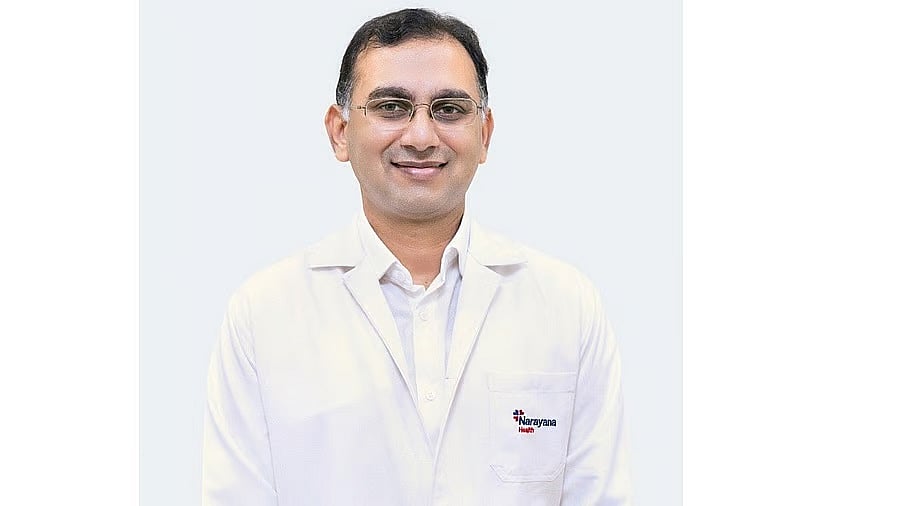The alarmingly rising rate of colorectal cancer in India needs urgent attention. Dr Uday Nagesh Shivaji, Clinical Lead and Senior Consultant Gastroenterologist, Narayana Health City, Bengaluru, elaborates
Colorectal cancer (CRC), affecting the large intestine and rectum, remains one of the most pressing public health concerns worldwide. Globally, it is the third most common cancer and the second leading cause of cancer-related mortality, responsible for over 1.90 million new cases and more than 9.30 lakh deaths in 2020 alone, as reported by the International Agency for Research on Cancer (IARC).
CRC primarily impacts individuals over 50, although shifting lifestyle patterns suggest that younger populations may now be at risk.
Understanding the Indian landscape
In India, data on CRC incidence is still limited and primarily derived from select population-based cancer registries. Current available figures show an annual incidence rate of 5.36 per one lakh for colon cancer and 5.17 per one lakh for rectal cancer in men. For women, colon cancer incidence stands at 4.30 per one lakh, but admittedly this is old data. While India’s incidence rates are relatively lower compared to Western nations, mortality rates are significantly higher, likely due to late-stage diagnosis and a lack of organised screening efforts.
Interestingly, regional variations exist, with higher risks noted among populations in the north-east and southern parts of the country. Further, men show a higher predisposition, and certain registries even report a predominance of rectal cancers.
Risk factors
Non-modifiable factors include:
Age: Over 50 years
History: Family history of CRC
Genetic syndromes: For example, Lynch Syndrome and Familial Adenomatous Polyposis
Modifiable lifestyle factors include:
Diet: High consumption of red and processed meats, diet low in fibre
Habits: Smoking and alcohol consumption
Lifestyle: Physical inactivity
In addition, individuals with inflammatory bowel disease (IBD) carry a heightened risk of CRC, due to chronic inflammation, necessitating vigilance and surveillance.
How CRC develops (pathogenesis)
CRC commonly follows the adenoma-carcinoma sequence, where benign polyps gradually progress to malignant tumours. This transformation is both predictable and detectable, making early identification critical in prevention efforts.
Diagnosis and screening are crucial
Early diagnosis is the key to improving survival outcomes. Several diagnostic approaches are currently in use.
Stool-based screening tests:
● Fecal Occult Blood Test (FOBT)
● Fecal Immunochemical Test (FIT). This is more sensitive (over 97 per cent) and is widely recommended
● Stool DNA tests. High sensitivity through molecular markers but expensive at present
Imaging and endoscopic methods:
● Colonoscopy – the gold standard
● Sigmoidoscopy
● CT colonography
Histopathological confirmation through biopsy remains essential for definitive diagnosis and for planning treatment.
Why screening matters
Robust evidence shows that routine screening can prevent CRC through early detection and removal of precancerous lesions. The National Polyp Study and data from the WHO IARC handbooks confirm the life-saving potential of organised screening programmes.
There are two main approaches:
● Opportunistic screening, performed or offered during routine healthcare interactions
● Population-based organised screening, systematically offered to eligible groups
Globally, countries such as the UK, Australia and Scandinavian nations have demonstrated the success of organised screening using FIT and colonoscopy under a national screening policy.
Where India stands in 2025
Despite the rising burden of CRC, India still lacks a national screening policy. Earlier expert opinions suggested that a large-scale programme might not be feasible due to logistical and infrastructural challenges. However, with growing awareness and evolving healthcare systems, it is time to reconsider and advocate for screening in high-risk individuals, such as adults over 45 years, smokers, individuals with high alcohol intake, those with a family history of CRC, obese individuals and those with a sedentary lifestyle.
Progress at Narayana Health
As of February 2025, Narayana Health has taken a proactive step by introducing FIT testing. This initiative aims to significantly increase early detection rates of colonic polyps and CRC, reinforcing the hospital’s commitment to preventive healthcare.
The road ahead: Making a national impact
Change starts small. Here’s how we can make a difference:
● Raise awareness and educate the public
● Publish epidemiological data to better understand local trends in India
● Model effective screening programmes and advocate for national adoption
● Collaborate with societies and policymakers to influence lasting change
● Launch education campaigns targeted at both healthcare providers and the public
Colorectal cancer is both preventable and treatable, especially when caught early. With a shifting epidemiological landscape and increasing life expectancy, India cannot afford to ignore the CRC challenge. Proactive screening, particularly through cost-effective tools like FIT, holds the promise of reducing the burden and saving lives. It’s time for clinicians, institutions and policymakers to step up and screen.
